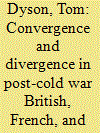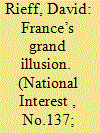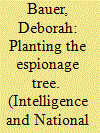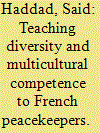|
|
|
Sort Order |
|
|
|
Items / Page
|
|
|
|
|
|
|
| Srl | Item |
| 1 |
ID:
085122


|
|
|
|
|
| Publication |
2008.
|
| Summary/Abstract |
Post-Cold War military reforms in Britain, France, and Germany have been characterized by patterns of convergence in the objectives, instruments, and institutional forums of defense policy but by divergence in temporality. These patterns of convergence and divergence cannot be fully explained by cultural approaches. Neither can they be explained solely by a focus on the role of international structure, as neo-realism posits, although the post-Cold War distribution of capabilities is driving Britain, France, and Germany toward policy convergence. Instead, the analysis builds upon the insights of neoclassical realism. Culture emerges not so much as a cause of action as instrumental and a resource for policy leaders in the domestic political and temporal management of reform.
|
|
|
|
|
|
|
|
|
|
|
|
|
|
|
|
| 2 |
ID:
141631


|
|
|
|
|
| Summary/Abstract |
On 13 November 1934, the French military attaché to Berlin, General Renondeau, sent a dramatic report to the Head of the Army General Staff. This note compared the military ability of France to Germany. Renondeau violently attacked French conscripts, arguing teachers and the international had corrupted them. This article analyses this report, arguing that the internal political context of France was generally responsible for the alarmist tone. Domestic political turmoil led him to exaggerate the unreliability of French conscripts and underestimate the difficulties of the German army.
|
|
|
|
|
|
|
|
|
|
|
|
|
|
|
|
| 3 |
ID:
138621


|
|
|
|
|
| Summary/Abstract |
ARTHUR RIMBAUD’S great 1871 poem, “Morning of Drunkenness,” concludes with a famous prediction: “Now is the time of the assassins.” The poet’s ecstatic vision may have been off by 150 years, but, between them, Saïd and Chérif Kouachi and Amedy Coulibaly, the perpetrators of the mass murders in Paris at Charlie Hebdo’s offices and at a kosher supermarket at the Porte de Vincennes in January of this year, appear to have helped usher in a real time of the assassins, one whose end is nowhere in sight. For the trio had their own ecstatic, murderous visions, ones for which neither the institutions of the French state nor the various strata of French civil society (to the extent they are separable in a France that remains corporatist in a way most of its EU partners do not) seem to have any antidote.
|
|
|
|
|
|
|
|
|
|
|
|
|
|
|
|
| 4 |
ID:
145586


|
|
|
|
|
| Summary/Abstract |
Intelligence in France evolved as it professionalized at the end of the nineteenth century, led by determined individuals within the French army. However, in the centuries prior to the professionalization of espionage and counterespionage, military men rejected intelligence, viewing the practice with skepticism and disdain. This article asserts that there was a change in views towards espionage, particularly among the military, beginning in the middle of the nineteenth century. As the army went from eschewing intelligence to embracing it and taking the lead in its practice, the nature of intelligence work in France consequently reflected the goals and aims of the army, prioritizing military intelligence over others.
|
|
|
|
|
|
|
|
|
|
|
|
|
|
|
|
| 5 |
ID:
100025


|
|
|
|
|
| Publication |
2010.
|
| Summary/Abstract |
Through the example of the UN Interim Force in Lebanon (UNIFIL), this article examines how intercultural skills are used by the French military in their daily life during a peacekeeping operation. As an essential part of professional military education and a component of military efficiency, cultural awareness is supposed to play a key role in fulfilling peacekeeping missions. The contention here is that there is a gap between the official discourse on cultural awareness and the way that the military experience their daily life and perceive multiculturalism during operations. Cultural diversity does not feature as a trump card, and national boundaries remain strong, in for example the compartmentalization of areas of operation and the restrictive UN and national rules of engagement. These limit the formal and informal contacts between contingents and with the population.
|
|
|
|
|
|
|
|
|
|
|
|
|
|
|
|
|
|
|
|
|